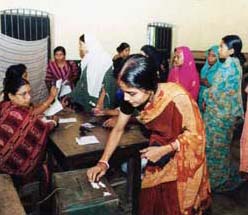
Politics of Mozambique takes place in a framework of a semi-presidential representative democratic republic, whereby the President of Mozambique is head of state and head of government of a multi-party system. Executive power is exercised by the government. Legislative power is vested in both the government and the Assembly of the Republic. The Economist Intelligence Unit has rated Mozambique as "hybrid regime" in 2016.

The Socialist People's Party of Montenegro is a socially conservative social-democratic opposition political party in Montenegro. It is part of the Key Coalition, an opposition political alliance in Montenegro. It has 2 of 3 MPs which it won in the 2016 parliamentary election. The party is pro-European Union and anti-NATO.

Elections in Bangladesh gives information on election and election results in Bangladesh.
Elections in Hungary are held at two levels: general elections to elect the members of the National Assembly and local elections to elect local authorities. European Parliament elections are also held every 5 years.

Elections in Lithuania include elections and election results in the country of Lithuania.
Coalition for a European Montenegro was the ruling political alliance in Montenegro headed by Milo Đukanović's Democratic Party of Socialists (DPS).

The Romanian presidential impeachment referendum of 2007 was conducted in order to determine whether the president of Romania Traian Băsescu should be forced to step down.
Country-wide local elections for seats in municipality and county councils were held throughout Norway on 10 September 2007, with some areas polling on 9 September as well. For most places this meant that two elections, the municipal elections and the county elections ran concurrently. In addition, several municipalities held direct mayoral elections.

Municipal elections were held in South Africa on 18 May 2011, electing new councils for all municipalities in the country. Municipal elections are held every five years, and the previous municipal elections were held in 2006. The first municipal elections following the reorganisation of municipalities took place in December 2000.

Parliamentary elections were held in Bulgaria on 5 July 2009. With 40% of the vote, the decisive winner of the elections was the established in 2006 personalistic party of Boyko Borisov - GERB. The Socialist Party, in power before the election, was in second place, with around 18%. Оnce-ruling National Movement Simeon II did not cross the 4% threshold and won no seats. The turnout was 60.2%, one of the lowest ever. Following the election, GERB leader Boyko Borisov became Prime Minister. Just like all the previous parliamentary elections since the fall of communism, the government was not re-elected.

General elections were held in Cambodia on 28 July 2013. The National Election Committee (NEC) announced that some 9.67 million Cambodians were eligible to cast their ballots to elect the 123-seat National Assembly. Voter turnout was reported to be 69.6%, a record low for a general election. Polling precincts opened 7:00 a.m. and closed at 3:00 p.m. The Cambodian Minister of Information, Khieu Kanharith announced in preliminary results that the Cambodian People's Party won 68 seats and the opposition Cambodia National Rescue Party won all the remaining 55 seats. This election marked the largest seat loss by the Cambodian People's Party to date, and their lowest share of seats since 1998.

The Belgian provincial, municipal and district elections of 2012 took place on 14 October. As with the previous 2006 elections, these are no longer organised by the Belgian federal state but instead by the respective regions:
The 2009 Sammarinese local elections were held on 7 June to elect the mayors and the councils of the nine municipalities of San Marino. Overall turnout was 55.1%. The election in the City of San Marino was declared invalid, as it didn't reach the turnout quorum. Therefore, a second election was held on 29 November.

Presidential elections were held in North Macedonia on 21 April 2019. Three candidates were on the ballot in the first round; Stevo Pendarovski of the ruling Social Democratic Union of Macedonia, Gordana Siljanovska-Davkova of the nationalist opposition VMRO-DPMNE party, and Blerim Reka, an independent representing the Albanian minority. The first round did not result in an absolute majority for any candidate, but Pendarovski won against Siljanovska-Davkova in the second round on 5 May.

Montenegrin municipal elections were held in all 21 municipalities, between June 2004 and October 2006. It resulted in the victory of the ruling DPS-SDP coalition in 15 out of 21 municipalities, where they secured a majority, alone or in a coalition with national minority parties.

Montenegrin municipal elections were held in all 21 municipalities, between April 2004 and October 2006. It resulted in the decisive victory of the ruling Coalition for European Montenegro in 18 out of 21 municipalities, where he has secured a majority, on its own or in a coalition with national minority parties.

Montenegrin municipal elections were held in all 23 municipalities, between March 2012 and May 2014.

Montenegrin municipal elections were held in all 23 municipalities, between April 2016 and May 2018.
Local elections were held on 12 March 2017 in Nikšić, on 7 May in Herceg Novi and on 26 November in the municipalities of Cetinje, Mojkovac and Petnjica, as well as Tuzi, which is set to become a municipality in 2018.

The sixth cabinet of Milo Đukanović was the cabinet of Montenegro from 4 December 2012 to 28 November 2016. It was a coalition government composed of centre-left Coalition for a European Montenegro and national minority parties. Split in the ruling DPS-SDP coalition in January 2016, leaving the government functioning as a de facto minority government. The Cabinet was functioning as the provisional government , from 12 May to 28 November 2016, with several Ministers from opposition parties joined the government.


















